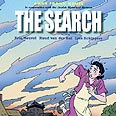
Comic book teaches kids about Holocaust
Dutch comic book is translated into Hebrew, helps kids learn about WWII in accessible, non-traumatizing manner
A Dutch comic book about the Holocaust has been translated into Hebrew and has become a valuable tool in teaching kids, Yedioth Ahronoth recenty reported.
"The Search" is narrated by a fictional Holocaust survivor, Ester Hecht, who tells her grandson and his friend about her childhood in Nazi Germany. Across the span of 60 pages, the colorful illustrations convey Hecht's life story: The prosecution that her family suffered after Adolf Hitler's rise to power, their escape to Holland, her parents' capture and death in Auschwitz and her own survival.
While the story isn't biographical, it does reflect the fate that befell many European Jews during World War II. The tale also includes the war's aftermath, when Jews resettled in Israel and Europe but made sure to keep the memory of the Holocaust alive.
The book, which was published by the Anna Frank House in the Netherlands, saw widespread success and was subsequently translated into several languages.
"The main challenge is to teach about a traumatic event like the Holocaust without traumatizing the children," said Dorit Novak, the director of the International School for Holocaust Studies at Yad Vashem, which publishes the book in Israel. "When you devise an educational program for kids, it has to match their cognitive and emotional capabilities. So when a teacher tells me, 'The class went great, but the kids didn't sleep for thee days afterwards,' I see it as a failure to meet the goal."
'Comics don't debase subject'
Teachers who attend the school's enrichment workshops are instructed to use the book as a teaching tool. Aside from the obvious appeal of the illustrations, the story is accessible for children, in part due to the colloquial language. The educators are charged with teaching the kids about the life that preceded and followed the Holocaust.
"We must talk about the survivors, and not only about death," Novak said. "We must tell (the kids) everything without hiding anything, lying or deceiving, but do it in a manner that doesn't scar them."
The story scarcely downplays the Nazi concentration camps and the destruction, but the book's illustrated nature communicates the narrative through short and accessible messages and in the kids' own language, according to Novack.
"It doesn't debase the subject of the Holocaust," she said. "The biggest risk that is faced by the Holocaust's victims is time and oblivion. In 10 years, there won't be anyone to tell the story, and only education will preserve the memory in the national and international consciousness."










